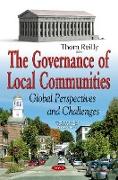- Start
- Governance of Local Communities
Governance of Local Communities
Angebote / Angebote:
The quality of local governance matters more than ever before. To many citizens, their local government is the most tangible form of government, and it is also the layer of government with which they have most contact in their everyday life. The power of the local administration is that it represents ordinary citizens. People eat, drink, work, play and socialise with others in towns and cities. To be fully effective, local government management and service delivery capacity needs to be strong, and resources need to be adequate. Civil society and businesses are essential actors in ensuring local governments have the capacity to meet the needs of its citizens. There are a host of challenges that confront local government in the 21st century: delivering quality services, lack of finance and local fiscal autonomy, engaging citizens and communities in meaningful and authentic ways, forming effective partnerships which incentivize local actors to find solutions to the many complex and intractable issues facing communities, generating inclusive and sustainable development, implementing strategies for disaster risk reduction, managing transparent communications, and, rapidly evolving technologies and socio-economic demographics. The Governance of Local Communities: Global Perspectives and Challenges is about the role that ideas, institutions, and actors play in structuring how people govern local communities and, more specifically, the types of adaptations necessary in local government roles and responsibilities, structures, and processes to effectively respond to a changing local government environment. Global changes require that we rethink local governance. A wide net of international experts on local governance was assembled for this volume to stimulate frank conversations around the many contemporary challenges facing local government.
Folgt in ca. 15 Arbeitstagen
